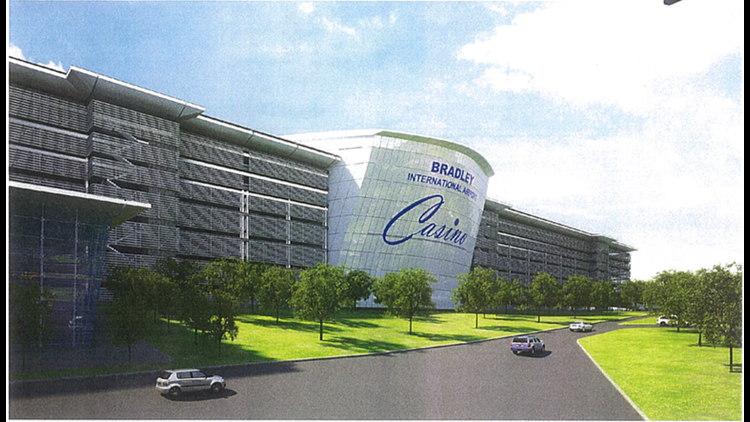HARTFORD – In a plan they said would be a bad deal for taxpayers, MGM Resorts International released documents Friday showing that the Connecticut Airport Authority had a secret plan that was hatched over the past year that would have resulted in the transformation of Bradley International Airport from an airport into a casino, with an attached airport.
MGM said they had originally tried to get the documents through the Freedom of Information when the CAA refused to release anything publicly.
MGM said that they have consistently advocated for a fair, open, transparent, and competitive process as Connecticut contemplates commercial casino gaming for the first time in state history.
The newly released documents show the CAA touted how a casino at Bradley could “capitalize on a captive audience,” with more than 17,000 passengers passing through the Windsor Locks facility daily.
The pitch was part of a proposal submitted last year to the Mashantucket Pequot and Mohegan tribes, who are reviewing locations for a proposed satellite casino to help blunt competition from MGM Resorts International’s planned casino in Springfield, Massachusetts.
MGM says it shows how the proposed, approximately 200,000-square-foot casino is much larger than suggested by the tribes.
The authority pulled plans in June to locate a casino at its new transportation center, but said there are other possible airport sites.
Alan Feldman, Executive Vice President for MGM, released the following statement:
“After reading through the documents, three things are very clear. First, officials at the CAA and in the Town of Windsor Locks, in communication with the Mohegans and the Mashantucket Pequots, hatched a very detailed plan in secret over the course of the past year – with no public input – to completely remake Bradley International Airport, converting it from an airport into a casino,” said . “Calling this a ‘satellite casino’ – which is how they all referred to this in public – is like calling the Grand Canyon a hole in the ground. The second thing that’s clear is that this would be a very bad deal for taxpayers. They are trying to avoid providing any community benefits, infrastructure improvements or labor protections. These are just some of the typical benefits that come from an open, competitive process when a commercial casino is built. The third thing that’s clear is that despite what airport and town officials have repeatedly said in public, we know from documents released by the Freedom of Information Commission (FOIC) that the CAA was prepared to make significant financial and permit concessions without any public debate or referendum.
Feldman said in the statement that he thinks the real problem is “the process by which this plan was hatched. Maybe the most troubling thing here is that this entire process was conducted in secret with absolutely no public input. It’s the same type of process that led to the Hartford baseball stadium debacle: no public input, no public acknowledgement of any of the important details. No competition among prospective bidders. These types of processes are bad for taxpayers in a whole host of ways; sometimes they even result in empty, unfinished projects and a lot of lawsuits. If this is in fact what Connecticut wants to do – build a full-size casino, not a “slots parlor” — MGM would welcome the opportunity to compete to build this type of facility. We believe that can be done without turning the region’s major airport into a casino. There’s no doubt that developers from all over North America would welcome an opportunity to compete as well. That’s why today we are reiterating our call for a new process to be put in place as Connecticut gets ready to build its first commercial casino. The process should be open, fair, transparent, and competitive. And there should be a lot of public input. That type of process will guarantee the best outcome for Connecticut and local towns in terms of investment, jobs created and revenue generated.”



